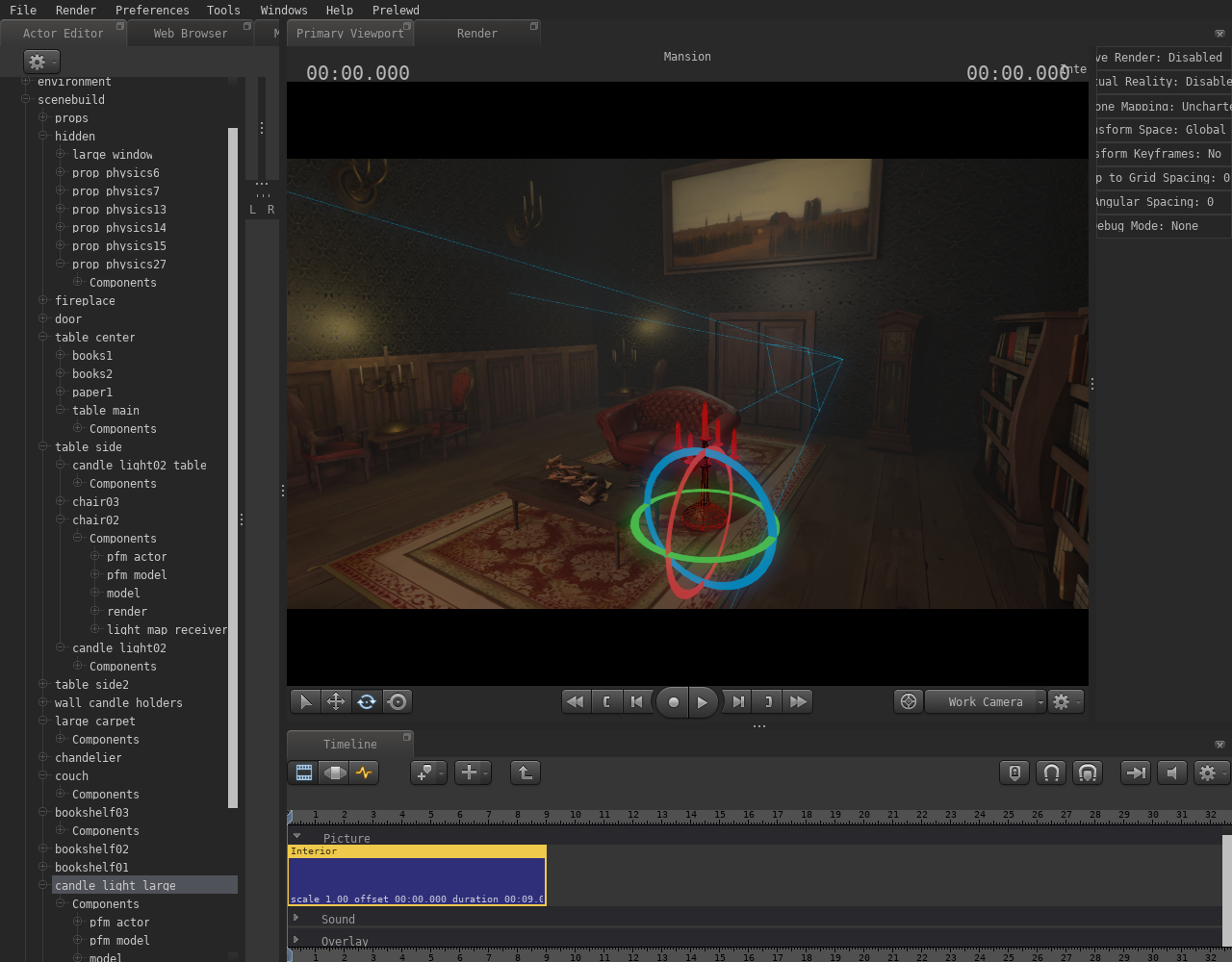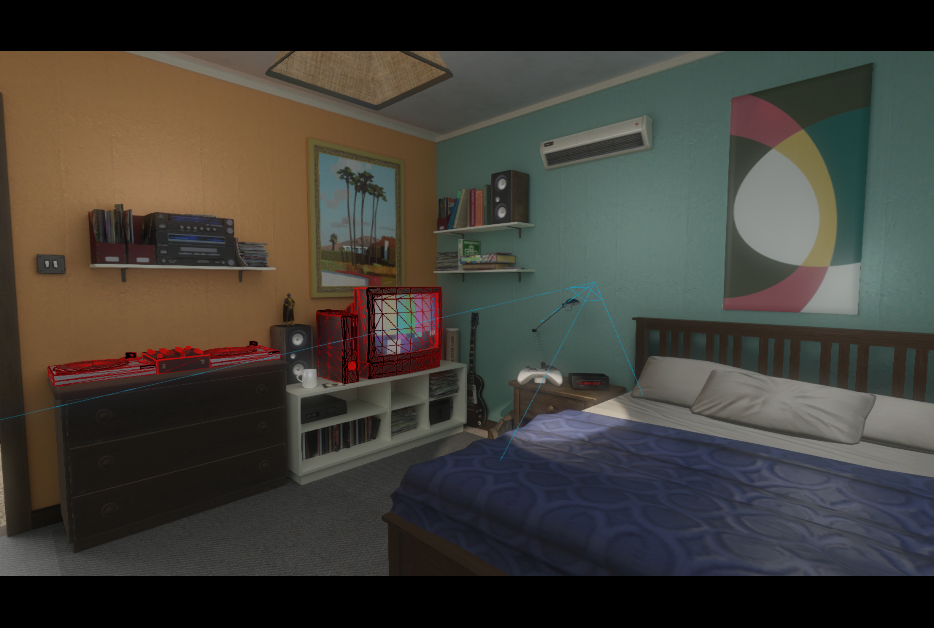This is the repository for the Pragma Game Engine. For more information, visit the official website: https://pragma-engine.com/
- Windows 10 (or newer) / Ubuntu 22.04 LTS (or newer)
- Graphics card: GTX 1050 Ti or newer
- Memory: 4 GiB RAM or more
- ~60 GiB of disk space
- CMake 3.21.4 or newer
- Python 3.9.5 or newer
- Visual Studio 2022 or newer
- clang-14 or newer (Pragma is not compatible with gcc!)
To build Pragma, all you have to do is run the following command from a command-line interface:
git clone https://github.com/Silverlan/pragma.git --recurse-submodules && cd pragma && python build_scripts/build.py --with-pfm --with-all-pfm-modules --with-vrThis will clone Pragma and run the build-script, which will automatically download all dependencies, configure CMake, and build and install the project (this will take several hours).
If you don't need the filmmaker, you can omit the --with-pfm --with-all-pfm-modules arguments, which will reduce the build time and the required amount of disk space.
⚠️ Linux
Do not run the script as superuser.
The script will automatically install all required system packages. Since this requires admin priviliges, you may be prompted for your password several times.
You can disable confirmation prompts (e.g. for automated builds) by adding the--no-confirmargument, however entering your password may still be required.
Once the build script has been completed, you should find the build files in pragma/build, and the install files in pragma/build/install. The install directory should contain everything you need to run Pragma.
If you make any code changes to the core engine code, you can build the pragma-install target to build them. This will also re-install the binaries.
If you make any code changes to a module, you will have to build the module build target first, and then build pragma-install afterwards.
After the initial run of the main build script, you can run the following command from the root directory of Pragma to update Pragma to a newer version:
python build_scripts/build.py --updateThis will pull all of the latest changes for the Pragma repository and the modules. The --update option will re-use all of the arguments used in the last execution of the build script, so you don't have to specify them again.
Running the build-script with the arguments above will build and install Pragma and the Pragma Filmmaker with all dependencies. Alternatively you can also configure the build to your liking with the following parameters:
| Parameter | Description | Default |
|---|---|---|
--help |
Display this help | |
--generator <generator> |
The generator to use. | Windows: Visual Studio 17 2022Linux: Unix Makefiles |
--c-compiler |
[Linux only] The C-compiler to use. | clang-14 |
--cxx-compiler |
[Linux only] The C++-compiler to use. | clang++-14 |
--no-sudo |
[Linux only] Will not run sudo commands. System packages will have to be installed manually. | 0 |
--no-confirm |
[Linux only] Disable any interaction with user (suitable for automated run). | 0 |
--with-essential-client-modules <1/0> |
Include essential modules required to run Pragma. | 1 |
--with-common-modules <1/0> |
Include non-essential but commonly used modules (e.g. audio and physics modules). | 1 |
--with-pfm <1/0> |
Include the Pragma Filmmaker. | 0 |
--with-core-pfm-modules <1/0> |
Include essential PFM modules. | 1 |
--with-all-pfm-modules <1/0> |
Include non-essential PFM modules (e.g. chromium and cycles). | 0 |
--with-vr <1/0> |
Include Virtual Reality support. | 0 |
--build <1/0> |
Build Pragma after configurating and generating build files. | 1 |
--build-all <1/0> |
Build all dependencies instead of downloading prebuilt binaries where available. | 0 |
--build-config <config> |
The build configuration to use. | RelWithDebInfo |
--build-directory <path> |
Directory to write the build files to. Can be relative or absolute. | build |
--deps-directory <path> |
Directory to write the dependency files to. Can be relative or absolute. | deps |
--install-directory <path> |
Installation directory. Can be relative (to build directory) or absolute. | install |
--verbose <1/0> |
Print additional debug information. | 0 |
--update <1/0> |
Update Pragma and all submodules and modules to the latest versions. | 0 |
--module <moduleName>:<gitUrl> |
Custom modules to install. Use this argument multiple times to use multiple modules. |
Example for using the --module parameter:
--module pr_physx:"https://github.com/Silverlan/pr_physx.git"If you want to add functionality to Pragma without changing the core source code, you can do so by creating a custom binary module. The setup for this is very simple and only takes a few minutes. For more information, please check out the wiki article.
There are also various pre-made binary modules available for Pragma, some of which are already included with this repository, and some of which can be found online:
⚠️ Some of these modules have not been maintained and may no longer be compatible with the latest version of Pragma.
- pr_chromium: https://github.com/Silverlan/pr_chromium
- pr_curl: https://github.com/Silverlan/pr_curl
- pr_mysql: https://github.com/Silverlan/pragma/tree/master/modules/pr_mysql
- pr_pcl: https://github.com/Silverlan/pragma/tree/master/modules/pr_pcl
- pr_prosper_opengl: https://github.com/Silverlan/pr_prosper_opengl
- pr_prosper_vulkan: https://github.com/Silverlan/pr_prosper_vulkan
- pr_socket: https://github.com/Silverlan/pragma/tree/master/modules/pr_socket
- pr_video_recorder: https://github.com/Silverlan/pragma/tree/master/modules/pr_video_recorder
- pr_xml: https://github.com/Silverlan/pragma/tree/master/modules/pr_xml
- pr_audio_dummy: https://github.com/Silverlan/pragma/tree/master/modules/pr_audio_dummy
- pr_cycles: https://github.com/Silverlan/pr_cycles
- pr_source: https://github.com/Silverlan/pr_source
- pr_xatlas: https://github.com/Silverlan/pr_xatlas
- pr_openvr: https://github.com/Silverlan/pr_openvr
- pr_truesky: https://github.com/Silverlan/pr_truesky
- pr_opensubdiv: https://github.com/Silverlan/pr_opensubdiv
- pr_sqlite: https://github.com/Silverlan/pr_sqlite
- pr_xnalara: https://github.com/Silverlan/pr_xnalara
- pr_mpv: https://github.com/Silverlan/pr_mpv
- pr_dmx: https://github.com/Silverlan/pr_dmx
- pr_steamworks: https://github.com/Silverlan/pr_steamworks
- pr_gpl: https://github.com/Silverlan/pr_gpl
- pr_steam_networking_sockets: https://github.com/Silverlan/pr_steam_networking_sockets
- pr_physx: https://github.com/Silverlan/pr_physx
- pr_bullet: https://github.com/Silverlan/pr_bullet
- pr_audio_fmod: https://github.com/Silverlan/pr_audio_fmod
- pr_audio_alure: https://github.com/Silverlan/pr_audio_alure
To build a module, simply run the build-script with the following parameter:
--module <moduleName>:<gitUrl>The build script will clone, build and install the module automatically. Alternatively you can also download the module manually to pragma/modules and omit the :<gitUrl> portion of the parameter.
If you only want to install a module without building it, you can also run the following console command from within Pragma to download and install the module automatically:
install_module <githubModuleName> [<version>]The githubModuleName consists of the GitHub username and the repository name.
If no version is specified, the latest release binaries will be used.
Example:
install_module Silverlan/pr_curlIn addition to binary modules, Pragma also uses Lua as scripting language, with thousands of available function, class and library bindings. To get more information about the Lua API, check out the official wiki. An example for a Lua-addon is the Pragma Filmmaker.
- SlawekNowy: For helping to make Linux support possible


